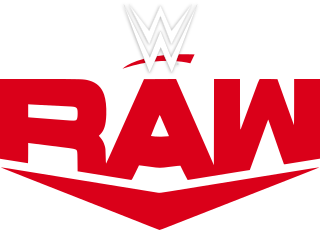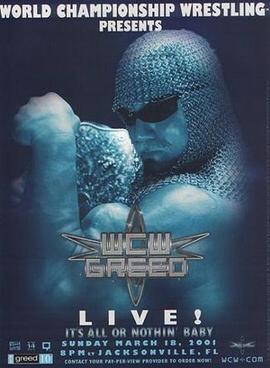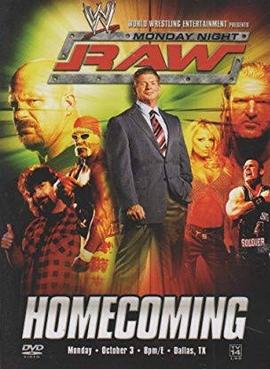
World Championship Wrestling (WCW) was an American professional wrestling promotion founded by Ted Turner in 1988, after Turner Broadcasting System, through a subsidiary named Universal Wrestling Corporation, purchased the assets of National Wrestling Alliance (NWA) territory Jim Crockett Promotions (JCP).

Eric Aaron Bischoff is an American television producer, professional wrestling booker, promoter, and performer. He is best known for serving as Executive Producer and later Senior Vice President of World Championship Wrestling (WCW) and subsequently, the on-screen General Manager of WWE's Raw brand. During his time in WCW, Bischoff was known as “Easy-E.” Bischoff has also worked with Total Nonstop Action Wrestling (TNA) where he served as Executive Producer of Impact Wrestling. He was inducted into the WWE Hall of Fame in 2021.

Kevin Scott Nash is an American retired professional wrestler, podcaster and actor, currently signed to WWE under a legends contract. He is also known for his tenures with World Championship Wrestling (WCW) and Total Nonstop Action Wrestling (TNA).

WWE Raw, also known as Monday Night Raw or simply Raw, is an American professional wrestling television program produced by WWE. It currently airs live every Monday at 8 p.m. Eastern Time (ET) on the USA Network, with minimal exceptions. The show features characters from the Raw brand, to which WWE employees are assigned to work and perform. It debuted on January 11, 1993, and is considered to be one of WWE's two flagship programs, along with Friday Night SmackDown.

The New World Order was an American professional wrestling group that originally consisted of "Hollywood" Hulk Hogan, Scott Hall, and Kevin Nash.

WCW Monday Nitro, also known as WCW Nitro or simply Nitro, is an American professional wrestling television program that was produced by World Championship Wrestling (WCW) and broadcast weekly every Monday night on TNT in the United States from September 4, 1995 to March 26, 2001.

Vincent James Russo is an American professional wrestling writer, booker and pundit. He is notable for his tenures with the World Wrestling Federation, World Championship Wrestling (WCW) and Total Nonstop Action Wrestling (TNA) in creative roles. He also occasionally made appearances as an on-screen authority figure, and professional wrestler, in WCW and TNA.

The World Heavyweight Championship was a men's professional wrestling world heavyweight championship created and promoted by the American promotion WWE. It was the second world championship to be created by the company, after their original world title, the WWE Championship (1963). The title was one of two top championships in the company from 2002 to 2006 and from 2010 to 2013, complementing the WWE Championship, and one of three top championships from 2006 to 2010 with the addition of the ECW World Heavyweight Championship.

WCW Thunder, or simply Thunder, was an American professional wrestling show produced by World Championship Wrestling (WCW) which aired on TBS Superstation from January 8, 1998 to March 21, 2001.

Greed was the final professional wrestling pay-per-view (PPV) event produced by World Championship Wrestling (WCW). It took place on March 18, 2001 from the Jacksonville Memorial Coliseum in Jacksonville, Florida. Greed replaced the promotion's March PPV event Uncensored which was held from 1995 to 2000. The pay-per-view event took place three days before the final episode of Thunder and eight days before the final episode of Monday Nitro.

The Invasion was a professional wrestling storyline in the World Wrestling Federation during the Attitude Era that ran from March–November 2001 and involved stables of wrestlers purporting to represent World Championship Wrestling (WCW) and Extreme Championship Wrestling (ECW)—which merged to form The Alliance—placed against a stable of wrestlers purporting to represent the WWF. The storyline began shortly after the WWF's acquisition of WCW in March 2001, and concluded with a "winner takes all" match between The Alliance and the WWF at Survivor Series.

Noah Anthony Schiavone is an American sports announcer, professional wrestling commentator and podcaster. He is currently signed to All Elite Wrestling (AEW) where he serves as the play-by-play commentator for Collision, color commentator for Dynamite and Rampage, then also as senior producer. He has previously worked for Jim Crockett Promotions, the World Wrestling Federation, World Championship Wrestling (WCW), and Major League Wrestling (MLW). In addition to his work in wrestling, Schiavone has also worked as a broadcaster for the Gwinnett Braves/Stripers of Minor League Baseball and Georgia Bulldogs football.

The nickname Fingerpoke of Doom (FPOD) refers to an infamous incident in American professional wrestling which occurred on January 4, 1999, at the Georgia Dome in Atlanta, Georgia, during a live broadcast of Nitro, the flagship show of World Championship Wrestling (WCW).

Billionaire Ted is a series of comedic sketches that ran on World Wrestling Federation (WWF) programming in 1996. They were created to parody media mogul Ted Turner, who owned rival World Championship Wrestling (WCW), and several WCW wrestlers, including Hulk Hogan and "Macho Man" Randy Savage. The skits consisted of mocking Turner and WCW by referencing the age of their wrestlers as well as bringing up concerns about steroids. The skits were viewed as gradually becoming more malicious rather than parody, as they were broadcast in addition to the WWF chairman Vince McMahon complementing them with anti-Turner press advertisements outside of WWF programming. The skits were ended by USA Network president Kay Koplovitz, who felt they had moved away from parody and towards mirroring McMahon's personal opinions of Turner and WCW.

World Championship Wrestling (WCW) was an American professional wrestling promotion that existed from 1988 to 2001. It began as a promotion affiliated with the National Wrestling Alliance (NWA) that appeared on the national scene under the ownership of media mogul Ted Turner and based in Atlanta, Georgia. Prior to the launch of WCW as a separate promotion, the "World Championship Wrestling" name was used for a television program produced by NWA promotions Georgia Championship Wrestling and Jim Crockett Promotions on TBS; the name came from an Australian wrestling promotion of the 1970s.

The Attitude Era was a major era of professional wrestling within the World Wrestling Federation. The term "WWF Attitude" was used to describe its programming from November 9, 1997, to May 6, 2002. It began during the Monday Night War, a period in which WWF's Monday Night Raw went head-to-head with World Championship Wrestling's (WCW) Monday Nitro in a battle for Nielsen ratings each week from September 4, 1995, to March 26, 2001. In June 1996, Stone Cold Steve Austin became King of the Ring, defeating Jake Roberts in the tournament final. To cap off the victory, Austin delivered his “Austin 3:16" promo, starting the buildup to the Attitude Era. The era was officially initiated on November 9, 1997, at Survivor Series 1997, when a video package aired ending with the first use of the "WWF Attitude" scratch logo; this was immediately before the main event featuring Bret Hart vs. Shawn Michaels, which retrospectively would be known as the Montreal Screwjob due to the match's controversial finish. WWF's programming in this era featured adult-oriented content, which included increased depicted violence, profanity, and sexual content. This era was part of a wider surge in the popularity of professional wrestling in the United States and Canada as television ratings and pay-per-view buy rates for WWF and its rival promotions saw record highs.

The Monday Night War or Monday Night Wars was an era of mainstream televised American professional wrestling, from September 4, 1995 to March 26, 2001, in which the World Wrestling Federation's Monday Night Raw and World Championship Wrestling's (WCW) Monday Nitro were broadcast opposite each other in a battle for Nielsen ratings each week. It largely overlapped with the Attitude Era, a period in which the WWF used the term "WWF Attitude" to describe its programming from November 9, 1997 to May 6, 2002.
In March 2010, professional wrestling promotion Total Nonstop Action Wrestling (TNA) moved their weekly television program, Impact!, from airing on Thursdays to airing Monday nights. In doing so, TNA placed Impact! in direct competition with World Wrestling Entertainment's (WWE) flagship program Monday Night Raw. It drew comparisons to the Monday Night War, in which defunct wrestling promotion World Championship Wrestling (WCW) program Nitro went head-to-head with Raw in a battle for higher Nielsen ratings each week from 1995 to 2001; this led Impact!'s move to sometimes be called "The New Monday Night Wars". The move was spurred by the signing of Hulk Hogan and Eric Bischoff, two central figures of the original Monday Night War. Unlike the ratings battle with WCW, TNA never gained traction against WWE, despite initially setting record high ratings for Impact!. Impact! returned to its Thursday night timeslot after declining ratings in May, less than two months after the move.

The history of WWE Raw began as WWF's Monday Night Raw on January 11, 1993. Over the next two decades, Raw would become the promotion's flagship show, achieving numerous milestones along the way.

Raw Homecoming was a television special that was broadcast live on October 3, 2005 on the USA Network. It was named as such because it was the first edition of WWE's flagship show Monday Night Raw to air on the USA Network since 2000, after airing on Spike TV for the previous five years.
















